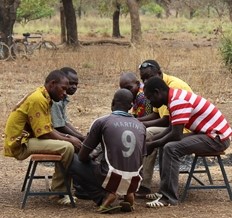
Houston, TX (ANS) – Moral and spiritual leadership will have a greater and longer lasting impact than institutional, organizational or governmental leadership. Good leadership is needed all over the world. There is global awareness and recognition of the need for good leadership. The important question is, what is good leadership and how does one become a good leader? Biblically based and Jesus-focused leadership is also needed in the Church, which is not always the case.
Culture Matters
The leadership training one receives in the typical university or seminary in the Western world is not necessarily adequate for training leaders in the rest of the world? For example, will it work among oral people groups in the bush in West Africa, remote villages in Central Asia, or the Amazon basin in South America? The answer is obviously no. There are many cultural aspects that need to be taken into consideration. The leadership that matters most is best modeled in the life, the teaching and Spirit of Jesus.

Transferable Concepts
In our experience over the years with Living Water International, and many partner organizations, we have discovered some powerful strategies of leadership development. This leadership training model requires no text-based materials or technological resources. The lessons we learn from the Lord Jesus and throughout Scripture are effective, universal, and transferable. Consider how Jesus developed leaders and what He taught those early followers.
True Greatness
Some of the most basic lessons about leadership are those Jesus talked about with His disciples. He said if you want to be great in God’s kingdom, learn to be a servant of all. He said that even the Son of Man came not to be served, but to serve. Servant leadership has become an important topic of discussion within the leadership development industry these days. Some would say that servant leadership is really the only way to effectively lead. Mentoring and modeling of course are key components.
Oral Strategies

Within the orality movement, we have discovered many important lessons that are biblical, understandable and reproducible to any place and people group on the planet. Once someone has received appropriate orality training for communicating the gospel and making disciples, they have a foundation and framework to build on for other areas and applications. Now we are seeing how the concepts, principles, and practices of orality can be effective in many different areas. Some of those applications would include trauma therapy, racial reconciliation, conflict resolution, church planting, addressing tribal conflict, community development, as well as leadership development.
Modeling and Mentoring
In our Orality Leadership Workshops we focus on character development. Knowledge and skill are important, but secondary to character. We emphasize that the most important thing about leadership is the leader and his or her character. Modeling and mentoring are often more important than simply sharing instruction and information.
Character Matters
Most leaders do not fail because of a lack of knowledge or skill, but because of character flaws. We read or hear about leadership failures almost daily in the news. Consider the recent failures and downfalls of so many government officials, corporate executives and even pastors and church leaders. Many intelligent, well-educated and gifted people in leadership positions fail because of spiritual immaturity or moral and character issues.
Collective Wisdom
In training and developing leaders, there is great power in tapping into the collective knowledge and wisdom of groups. So, we start by asking questions, such as the following:
- What are the most important lessons or principles about leadership?
- Where can we find the best contemporary resources for leadership?
- Who are some of the best models and examples of good leadership today?
- Who have been the most effective leaders throughout history?
- Who are the best and most effective models of leaders in the Bible?

After collecting answers to these questions from the group of trainees, we engage in a guided discovery model of learning. This process may result in identifying as many as 75 to 100 traits, lessons or attributes of leaders and good leadership principles. We then categorize all those under 10 core character values.
Fruitful Practices
Dr. John (Skip) Garmo, founder and former CEO of Character Solutions and author of “The Leader’s SEEcret,” using ten core character values, has provided a framework for this training. While knowledge and skill are important, we emphasize that character is what matters most. To enhance our efforts in training leaders, we have formed a Leadership Development Collaboration Group, made of a wide variety of leadership professionals, business leaders, pastors and mission executives. The goal is to identify the most fruitful practices and learning from the global community of leaders, as well as lessons from history and biblical characters. Then to oralize and contextualize the message and methods, so they are transferable, cross-cultural and reproducible to any place and people group on the planet.
Power of Questions
One of the most effective methods of leadership development is the appropriate use of questions. Asking questions and engaging in group discussions will result in healthy exchange of ideas, knowledge and experiences. This is sometimes referred to as a guided discovery model, which often works better than telling or direct instruction. A great resource for using questions for effective leadership is Bob Tiede’s – https://leadingwithquestions.com
Needs and Opportunities
In the regions where the church is growing the fastest, the rapidly reproducing church planting and disciple making movements, seem to be the greatest need for leadership training. One of the most basic questions, whether it’s related to communicating the gospel, disciple making, church planting or leadership training, is to consider if we are doing so according to the normal methods that people prefer to receive their news, information, or instructions.

Influence Matters
Over the years, I have often heard people say, “Leaders are readers.” Well, that’s great for people who can and will read, and if they have access to reading materials. However, we now know that oral learners and communicators can become good leaders when properly trained. Just as Jesus is our best model and example as a communicator and disciple maker, He is also our best model for leadership training. Not only is He our model and example, but when we are born again, indwelt by His Spirit, made complete in Him, we all have the capacity for influencing and leading others.
Unlikely Leaders
There are many examples throughout history of how God has used ordinary people in leadership roles to influence and impact many for His Kingdom purposes. Humanly speaking, we may think of the most well educated, those with certain titles or high profile personalities as being great leaders. However, Samuel Chadwick, in his classic book, “The Way to Pentecost,” gives a great perspective that all spiritual effectiveness can be attributed to the indwelling Christ and the power of the Holy Spirit. He writes, “There are other kinds of ability than that which comes of God through the Spirit, but they are death-dealing and never life giving.” He has also said, “It is this mystery that has filled the history of the Church with anomalies. Inadequate men (and women) are always doing impossible things, and ordinary men achieve extraordinary results. God’s biggest things seem to be done by the most unlikely people.”
For more information, visit: www.water.cc or www.orality.net





